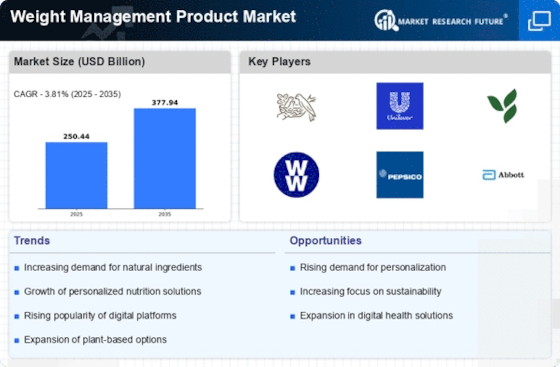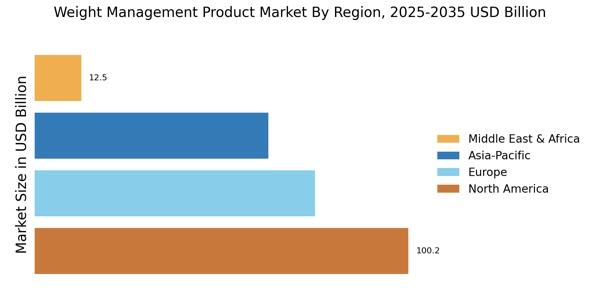Increasing Obesity Rates
The prevalence of obesity continues to rise, prompting a heightened focus on weight management solutions. According to recent data, approximately 36% of adults are classified as obese, which has catalyzed demand for effective weight management products. This trend is particularly pronounced in regions where sedentary lifestyles and unhealthy dietary habits are prevalent. The Weight Management Product Market is responding to this challenge by offering a diverse array of products, including meal replacements, dietary supplements, and fitness programs. As awareness of obesity-related health risks grows, consumers are increasingly seeking products that can assist in weight loss and maintenance. This surge in demand is likely to drive innovation and competition within the industry, as companies strive to meet the needs of health-conscious consumers.
Growing Health Consciousness
There is a marked increase in health consciousness among consumers, which is significantly influencing the Weight Management Product Market. Individuals are becoming more aware of the importance of maintaining a healthy weight for overall well-being. This shift in mindset is leading to a greater demand for products that promote weight loss and healthy living. Market data indicates that the health and wellness sector is projected to grow substantially, with consumers actively seeking out weight management solutions that align with their lifestyle choices. This trend is further fueled by the proliferation of information available through digital platforms, enabling consumers to make informed decisions about their health. As a result, companies in the weight management sector are likely to adapt their offerings to cater to this growing demographic of health-conscious individuals.
Rising Demand for Natural Ingredients
The Weight Management Product Market is witnessing a shift towards natural ingredients as consumers become more discerning about the products they consume. There is a growing preference for weight management solutions that utilize organic and non-GMO components, reflecting a broader trend towards clean eating. Market data indicates that products featuring natural ingredients are gaining traction, as consumers associate them with fewer side effects and greater efficacy. This trend is prompting manufacturers to reformulate existing products and develop new offerings that align with consumer preferences for transparency and sustainability. As the demand for natural weight management solutions continues to rise, companies that prioritize these ingredients are likely to gain a competitive edge in the market.
Influence of Social Media and Marketing
The impact of social media on consumer behavior is reshaping the Weight Management Product Market. Platforms such as Instagram and TikTok are increasingly utilized for marketing weight management products, influencing purchasing decisions among a diverse audience. The visual nature of these platforms allows brands to showcase success stories and product effectiveness, thereby enhancing consumer trust and engagement. Market analysis reveals that social media marketing strategies are becoming essential for companies aiming to reach younger demographics who are more likely to seek weight management solutions online. This trend suggests that effective social media campaigns can significantly boost brand visibility and sales within the industry. As the role of social media continues to expand, it is likely to remain a critical factor in the marketing strategies of weight management product companies.
Technological Advancements in Weight Management
The integration of technology into weight management solutions is transforming the Weight Management Product Market. Innovations such as mobile applications, wearable fitness trackers, and online coaching platforms are becoming increasingly popular among consumers. These technologies provide users with personalized insights and real-time feedback, enhancing their weight management efforts. Market Research Future suggests that the use of technology in health and wellness is expected to expand, with a significant portion of consumers utilizing digital tools to track their progress and stay motivated. This trend not only improves user engagement but also fosters a sense of community among individuals pursuing similar health goals. As technology continues to evolve, it is likely to play a pivotal role in shaping the future of the weight management sector.

















